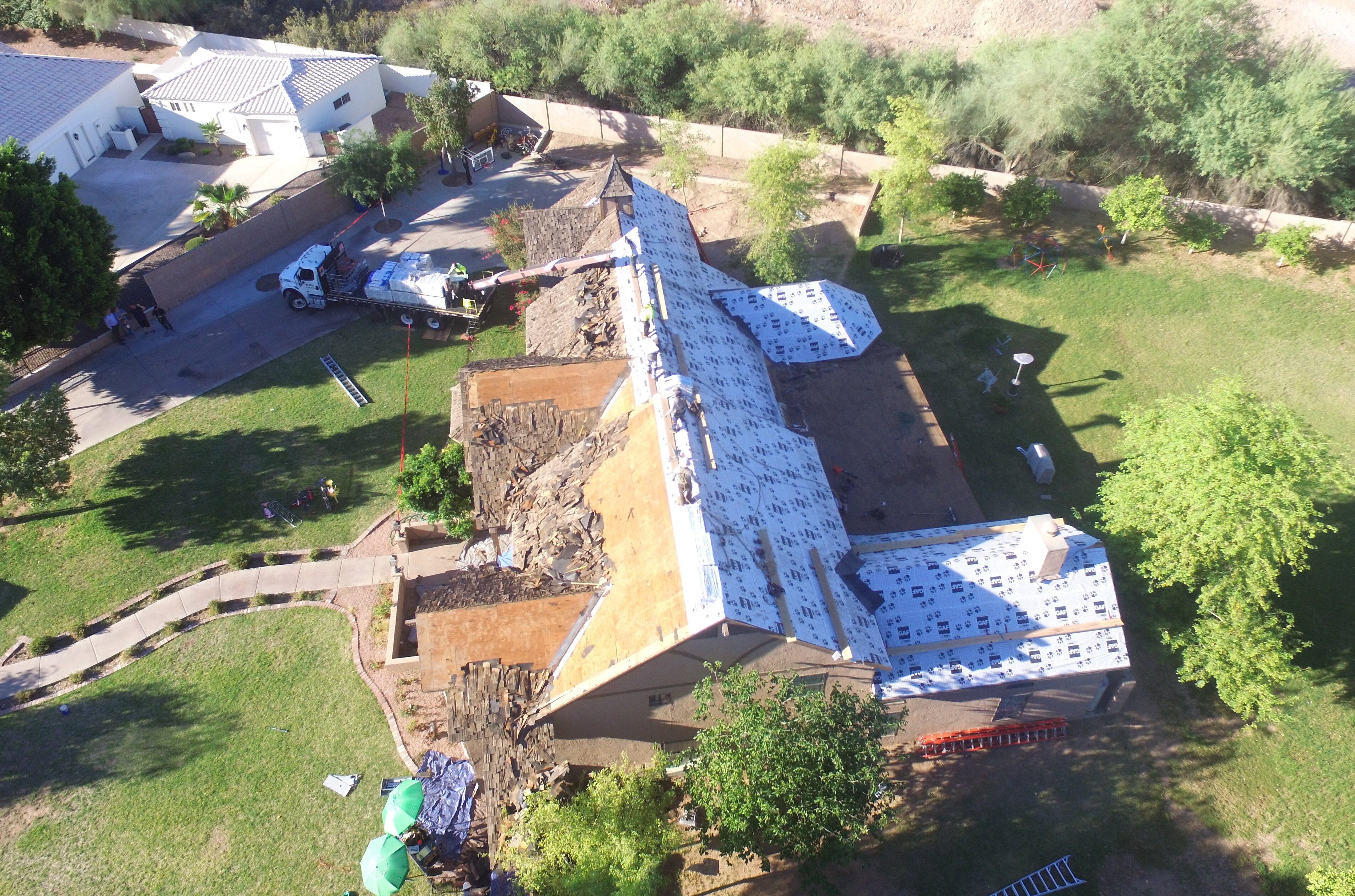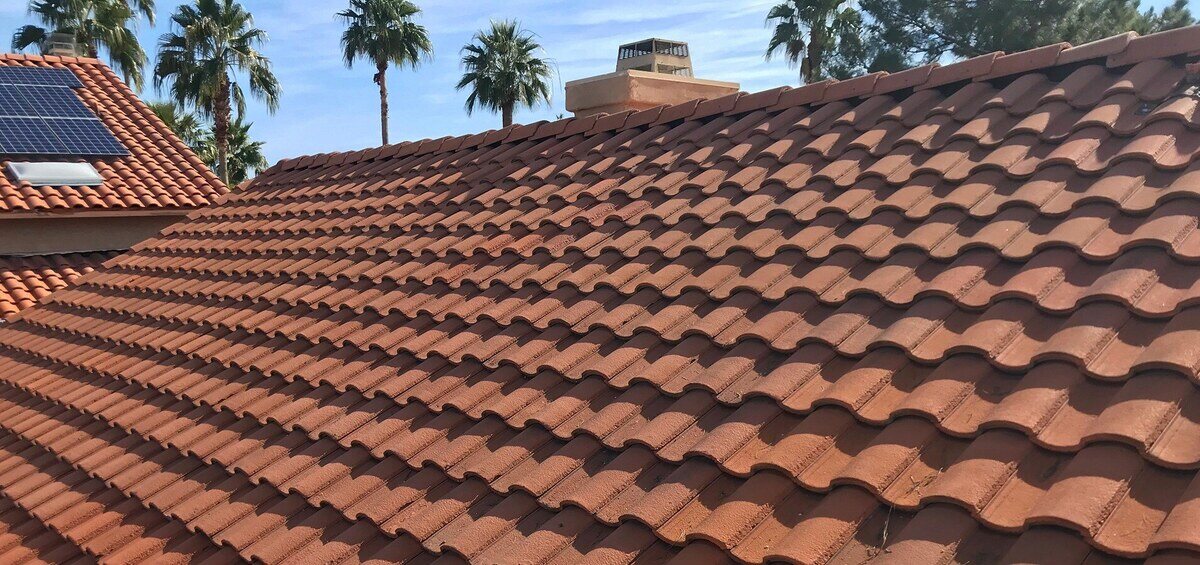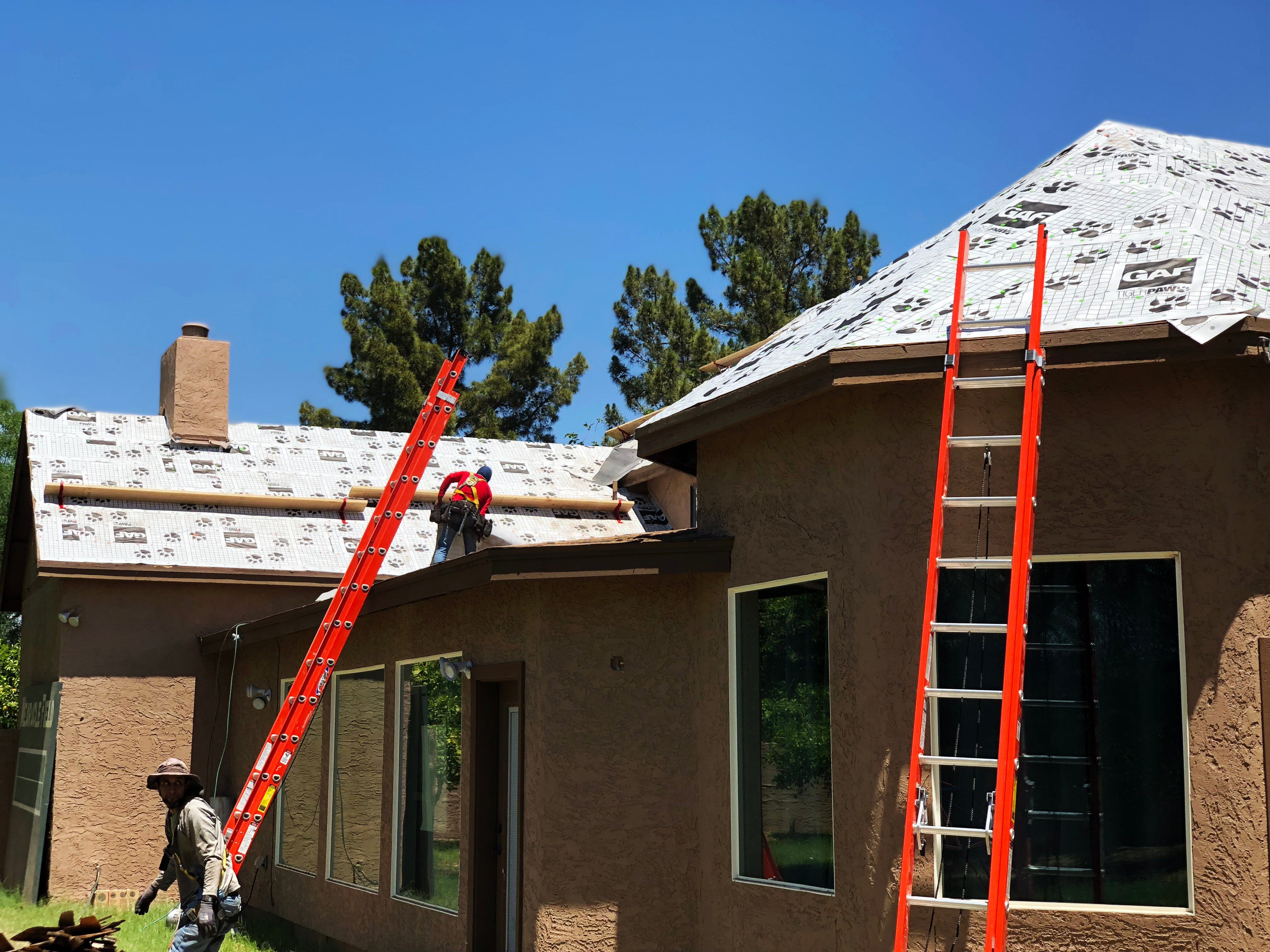Tile Roofs in Arizona: What to Watch for as Your Roof Ages
Home / Azul Blog / Tile Roofs in Arizona: What to Watch for as Your Roof Ages Tile roofs are one of the most popular roofing systems across Arizona—and for good reason. Clay and...
8 min read
Jack Daniels, Estimator and Sales Integrator : Updated on September 19, 2025

Home / Azul Blog / Replace vs Repair a Roof: Factors to Consider Before You Decide
If you’ve noticed any unwelcome leaks in your home - or maybe it’s just starting to look a bit tattered up top – you’re probably wondering whether it’s time for a full re-roof, or if a simple roof repair will get you by. Both options ultimately achieve the goal of correcting the issue or preventing future leaks, but which one is the right solution for your home?
This is a good question, and there are various factors that need to be considered when making your decision. You'll want to take into account your roof's age, your budget, and how long you'll be in the home, to name a few.
In this article, we’ll outline 6 key considerations to help you determine whether you need a roof repair or a complete roof replacement. If, by the end, you’re still not sure whether to replace or repair, contact us for a free, no-obligation roof evaluation and we’ll be happy to provide further guidance.
Things to consider when deciding between a roof repair and a roof replacement include the age of your roof, extent of damage, urgency of the issue, budget, building codes, and your long-term plans.
The age of your roof is probably the most important factor when choosing between a replacement or repairs. If your roof is having issues and it’s nearing the end of its lifetime, our general recommendation would be to invest in a new roof rather than put money into a repair – only to have another age-related issue pop up a few months down the road.
If your roof is relatively new with a good amount of years left in it, repairing can help you get the most value out of your investment. It’ll also have a more positive environmental impact, since it means the materials used to build your roof get maximum use rather than being discarded in a landfill before their time.
So, how can you know if your roof is nearing the end of its lifespan? It all depends on what material it’s made from. Some roofing materials can last 50+ years, while others come in around the 20-25 year mark. Regular annual maintenance is also crucial for extending your roof’s lifespan, as it helps catch small issues before they turn into costly repairs or premature replacements.
Read: Which Type of Roofing Material Lasts the Longest in Arizona?
It’s not always so straightforward, however. If you didn't install your home's current roof, or have no information from the previous seller, it can be hard to know exactly how old it is. In that case, the best idea is to contact a trusted roofing contractor who can give you an honest idea of how much life it has left. We’ll be happy to help.
You can also look out for some of these general signs of an old or aging shingle roof:
Of course, every roof is different, and seeing these signs won’t always mean your roof is nearing the end of its lifespan. On the other hand, not every roof that’s on its way out will exhibit these signs, either. Use them as a general guide.
The extent of roof damage can also indicate whether roof repairs will do the trick or an entire roof replacement is needed. If you’re just missing a few shingles that blew off in a storm, repairs will probably be fine. If you’re experiencing frequent leaks or seeing signs of sagging, then it might be time for a replacement.
Sometimes, the cost of repairing extensive damage is almost as much as replacing the roof itself. In that case, it might be worth committing to a full replacement. This not only makes economical sense, but can potentially reveal any underlying issues that could be causing the damage.
How badly do you need to fix that leak? If a major storm is forecast in the near future, you might be better off with a quick repair that avoids causing further damage.
Whatever you do, don’t fall prey to the trap of waiting for storm season to be over before you address those roof leaks. Doing so can create ample opportunity for those minor issues to grow into major – and costly – problems. If water damage reaches the interior of your house, or under the roof, you might be looking at more than just a roof replacement in the future.
What you're comfortably able to spend on your roof right now also plays a part in whether you should get a roof repair or replacement. If a completely new roof isn't in your budget at the moment, look into repairs and at least get those leaks under control before they cause additional damage that may be even costlier down the road. Depending on the severity of your roof's issue, a qualified roofing company might be able to fix it and buy you enough time to safely save for a new roof.
If you can afford a roof replacement and your roofing contractor recommends one, we would suggest following their advice. This will ensure no future problems arise, which can ultimately save you money — not to mention time and headaches — since you won't be spending it on continuous repairs. Also, new roofs generally come with a warranty on both materials and workmanship. Wouldn't that be nice?
If your roof is older, matching the exact color and texture of the shingles for a repair can be challenging. A skilled roofer with a wide selection of materials can usually get close, but if aesthetics are a priority, replacing an entire roof plane - or even opting for a full reroof - may be the best way to avoid a noticeable patch.
Do you think you're in your forever home, or are you looking to move within the next couple of years? If you plan to be in your home for a long period of time, making a longer-term investment in your roof is typically a wise decision. Not only will this offer you peace of mind, but with today's innovation in roofing materials, you might never have to replace or repair it again!
If you’re looking to move soon, simply repairing what's damaged could be a better choice depending on how much your current roof’s state detracts from the sale of your home. Some sellers find it hard to sell their home with an old roof. If that is the case for you, a replacement might be your only option at this point. Having a new roof is very marketable if you decide to sell, and it might even net you a better offer because the buyers know that a major expense is already out of the way.
Now that we’ve looked at the major considerations, let’s explore the pros and cons of roof repairs vs roof replacements.
Let’s take a look at some of the benefits of repairing your roof instead of replacing it entirely.
Repairing can help you extend the lifespan of your current roof. For younger roofs, repairs are almost always the better option depending on the severity of the issue.
For older roofs, repairs can be a way to temporarily fix issues and give you a little more time before a full replacement is needed. That said, every roof will have to be replaced eventually.
One of the biggest benefits of repairing a roof instead of replacing it is that repairs are far cheaper and quicker. When it comes to minor roofing issues, repairs are way more cost-effective and can be completed faster.
That said, bigger repairs can be costly depending on the issue. In that case, it can sometimes be more worthwhile to just go for a full roof replacement.
It's always sad to see a salvageable roof end up in a landfill. If your roof is in otherwise good shape, it’s better to just fix the problem and avoid the unnecessary waste.
It’s clear that there are many situations where a roof repair is the better option, but let’s take a look at some potential drawbacks.
Most roof repairs will require replacing missing or damaged shingles or tiles. Depending on the age of your roof, it might be challenging to get a good colour match for your existing materials. This is because their colors naturally fade with time due to wear and tear from the elements.
If we can’t find an exact match for your shingles or tiles, it can create a patchy and uneven look. Not every homeowner cares about this, and it’s not always immediately obvious, but it’s definitely something to be aware of before going for a roof repair.
Roof repairs are a specialized type of work. Not only do you want someone to fix the issue you’re experiencing, but you also need them to identify the source and provide long-term solutions.
Hiring an unqualified roofing contractor to work on your repairs could leave you with more problems than you originally had. A qualified roofing contractor will be able to properly diagnose and resolve issues to deliver long-lasting results. Be sure to do your research and find a company with a history of roof repairs and positive reviews.
Roof replacements can feel intimidating for some homeowners, but they can offer numerous advantages that make the leap worthwhile.
One of the first things people notice about homes is the roof. If your current roof is in rough shape, replacing it could help increase your home's curb appeal – which is especially important if you're looking to sell.
Putting money into a brand new roof will help raise the overall value of your home. As with the point above, this can come in useful when you go to sell your home, especially if the warranty is transferrable to the new owners.
With a roof replacement, you'll have peace of mind that your entire roof is healthy and will last for decades. You won't lose sleep when the next storm rolls through – and that feeling is priceless.
Despite the peace of mind of having a brand new roof over your head, there are certain drawbacks of a roof replacement that need to be considered.
The biggest con is quite obvious: it costs more to replace a roof rather than repair it. And unlike many other home improvement projects, you don’t get to enjoy fancy new features that make your investment feel immediately worth it. That said, a new roof will bring you peace of mind knowing that your home is protected with a solid foundation for decades.
Replacing a roof is a longer process than simply carrying out repairs. Depending on the size of your roof and materials, tearing off your old roof and installing a new one could take anywhere between 2-5 days in most cases.
Roof replacements can be noisy projects, which some people find disruptive. If possible, we always recommend heading out for the day while your new roof is being installed. It’s also important to consider how your pets might respond to the noise.
Roof repairs and roof replacements each have their place, depending on the age of your roof, the complexity and scale of the issue you’re experiencing, and your budget. While repairs can help extend the life of your roof, every roof will need to be replaced at some point.
If you’re still not sure whether you need a roof repair or a roof replacement, contact us for a free, no-obligation roof evaluation. We’ll give you an honest assessment of your roof’s condition and provide you with a few options for a solution. Call us now to book your roof assessment.
If a roof is nearing the end of its expected lifespan (which depends on the material), then investing in a full replacement is generally recommended rather than doing repairs that may only delay additional problems down the road.
If damage is extensive—frequent leaks, sagging structure, or when repairs cost almost as much as a full replacement—it’s usually more practical to replace
For urgent issues like active leaks—especially before or during monsoon season—a quick repair may be needed immediately to prevent more damage. But if the roof is old or the damage severe, that may tip the decision toward replacement.
Yes. If a full replacement is outside your current budget, repairs can address the immediate problem (e.g. leaks) while buying time to consider a full replacement plan in the future.
Matching old shingles for repairs can be hard due to color fading or discontinued styles. If appearance is important, replacing large sections or the whole roof may give a more consistent, aesthetically pleasing result.

Home / Azul Blog / Tile Roofs in Arizona: What to Watch for as Your Roof Ages Tile roofs are one of the most popular roofing systems across Arizona—and for good reason. Clay and...

Home / Azul Blog / Roof Underlayment 101: What It Is & Why It’s Important When most homeowners think about their roof, they picture the tiles, shingles, or foam that cover the top...